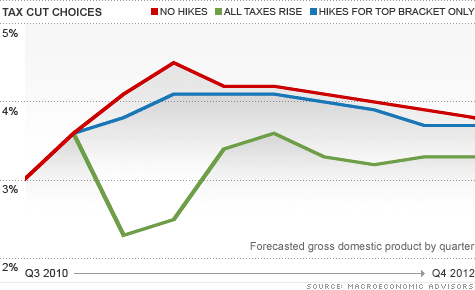Search News

NEW YORK (CNNMoney.com) -- Higher taxes on the nation's top wage earners could give a needed jolt to the struggling U.S. economy. Or it could be the tipping point that topples the nation back into recession.
That sums up the stakes in the debate over what to do when the so-called Bush tax cuts expire on Dec. 31.
Commonly-accepted economic theory says that a weak economy is bad time for a tax increase, as higher taxes slow spending and thus economic activity. But with the federal government running record deficits and many economists calling for additional stimulus, there are those who believe higher taxes are needed to fill the gap.
The Obama administration wants to keep the lower rates in place for most taxpayers earning less than $200,000 a year, even as rates in the top bracket are allowed to rise.
William Gale, co-director of the Urban-Brookings Tax Policy Center argues just about anything that government can do with the extra money -- extended unemployment benefits, infrastructure projects, aid to states and local governments -- is going to stimulate more economic activity than putting it in the pockets of the wealthiest taxpayers who he argues would save rather than spend the money.
"What we need to be doing right now is stimulate the economy," said Gale. "If the only choices are do nothing or extend the Bush tax cuts [for top earners], I'd extend the tax cuts. But that's not the choice."
Forecasts from Macroeconomic Advisors estimate that gross domestic product, the broad measure of the nation's economic activity, would rise at an annual 4.1% rate in the first quarter of next year if all tax cuts were extended. But if rates were only raised on the wealthiest taxpayers, the economy would grow at a 3.8% rate. That's far less of a hit than the 2.3% growth rate forecasted if everyone's taxes went up.
Similarly, the group's unemployment forecasts call for a 0.1 to 0.2 percentage point increase in the unemployment rate if there's a hike for high-income earners, but almost 1 percentage point higher unemployment by the late 2012 if everyone's taxes increase.
"I think you can make that case for high-income tax increases," said Joel Prakken, Macroeconomic Advisors' chairman. "Even though the economy is a little iffy, it's a drag we can absorb."
But even some of those who argue for an additional stimulus worry that the economy is too weak to increase anyone's taxes.
"The recovery is just too fragile to raise taxes, even though the [economic impact] from the upper income tax cuts is low," said Mark Zandi, chief economist for Moody's Analytics. He recommends a permanent extension of the tax cuts for the low- and moderate income wage earners, and a one-year extension for top wage earners, with a two-year phase-in of higher rates after that.
Brian Wesbury, chief economist at First Trust Portfolios, said that keeping all taxes as low as possible is always the best course for spurring the economy.
"Does it mean if we raise top rates, it's going to throw the world into a recession? No. But it's a mistake," he said. "Fewer jobs will be created and the economy will be less dynamic."
One risk of extending the tax cuts for the wealthy is it could be difficult to ever raise the top rates, especially if Republicans have greater strength in Congress next year as expected. And the lost revenue from those top-earner cuts, about $700 billion over the next decade, will add to the long-term federal deficit problem.
"If I believed that would be politically viable to have a one- or two-year extension (for top income tax cuts), I'd be happy with it," said Princeton economics professor Alan Blinder, a former Federal Reserve vice chairman and an economic advisor in the Clinton administration. "But once you start extending things, they become permanent."
Other economists argue that raising upper-income rates will hurt a broad range of workers who depend on the spending done by those with more discretionary income.
Pamela Villarreal, senior policy analyst for the National Center for Policy Analysis, a free-market think tank, says while the wealthy might save more money than lower income Americans, they also buy more than their share of goods ranging from cars to restaurant meals to movie tickets.
"When they stop spending money, there are plenty of lower-income people who end up getting laid-off," she said. ![]()






| Index | Last | Change | % Change |
|---|---|---|---|
| Dow | 32,627.97 | -234.33 | -0.71% |
| Nasdaq | 13,215.24 | 99.07 | 0.76% |
| S&P 500 | 3,913.10 | -2.36 | -0.06% |
| Treasuries | 1.73 | 0.00 | 0.12% |
| Company | Price | Change | % Change |
|---|---|---|---|
| Ford Motor Co | 8.29 | 0.05 | 0.61% |
| Advanced Micro Devic... | 54.59 | 0.70 | 1.30% |
| Cisco Systems Inc | 47.49 | -2.44 | -4.89% |
| General Electric Co | 13.00 | -0.16 | -1.22% |
| Kraft Heinz Co | 27.84 | -2.20 | -7.32% |
|
Bankrupt toy retailer tells bankruptcy court it is looking at possibly reviving the Toys 'R' Us and Babies 'R' Us brands. More |
Land O'Lakes CEO Beth Ford charts her career path, from her first job to becoming the first openly gay CEO at a Fortune 500 company in an interview with CNN's Boss Files. More |
Honda and General Motors are creating a new generation of fully autonomous vehicles. More |
In 1998, Ntsiki Biyela won a scholarship to study wine making. Now she's about to launch her own brand. More |
Whether you hedge inflation or look for a return that outpaces inflation, here's how to prepare. More |